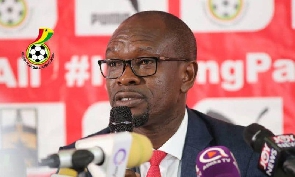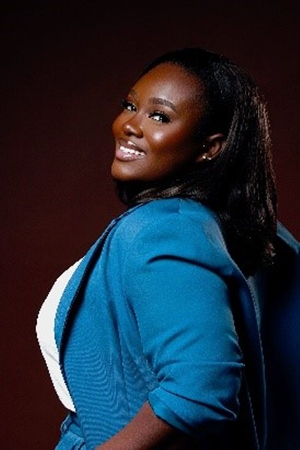General News of Thursday, 1 March 2018
Source: thestatesmanonline.com
Danquah Institute saved Ghana $5 billion - Gabby
Gabby Asare Otchere-Darko, a former Executive Director and Founder of Danquah Institute, has revealed that the institute saved Ghana a staggering amount of $5 billion as a result of public interest researches it conducted, particularly into the abortive Chinese loan saga under the previous National Democratic Congress government.
Additionally, he stated, the Institute’s advocacy work helped introduce sanity into good governance practices in Ghana, citing Parliament as one area where its contributions richly affected in enabling it reposition itself as the keeper and protector of the nation’s purse, which is its major responsibility.
He was speaking yesterday at the DI offices in Accra to launch the 10th anniversary of the founding of the Danquah Institute
Asserting that Parliament still has a long way to go in terms of protecting the nation’s purse since it is the institution that largely approves expenditure in Ghana, the former DI Director said the contribution of DI in enriching good governance was reflected in the decision by the Legislature in setting up research desks to enable informed contribution by the representatives of the people when important national issues are discussed.
He said, with huge support from the media, the Institute nudged Parliament into taking several policy decisions, all of which helped improve good governance in the country.
“It is important that we have such institutions to push Parliament. We pushed Parliament to live up to its task, to look up to protecting the public purse. And we managed to stop certain contracts and saved the country up to the tune of $5 billion,” he said.
He said, owing to that watchman’s role, certain contracts were amended, including the Chinese CDD loan, “not because the country should not take or did not need the loan for development, but due to the fact that the terms were not favorable for Ghana in the long term.”
He said that there was still the need for the state to support Parliamentarians to work in protecting the public purse and said that research DI had conducted earlier had revealed that Parliament had a weakness in terms of conducting research, which the Institute specializes in and which is why the DI should be seen by Ghanaians as a partner to development even though it has a certain political leaning.
Speaking on the history behind the establishment of the DI, Mr Otchere-Darko said that certain well-meaning individuals in society felt that it was important to have a research body to support the development of Ghana.
However, he noted that before DI, the think tanks in Ghana were shy to align themselves to a political party and come out clear on their political ideological stands.
He added that research works and advocacy by institutions like DI as a think tank must speak for itself to have credibility, so that the research can be used to influence and reinforce politics for the development of a country, affirming that that is just what the DI stands for.
“It is important to take deliberate intellectual institutional steps to drive our politics that way, otherwise it affects the kind of leaders we birth as a nation, and that is what Danquah Institute stands for,” he said.
He mentioned Arthur Kennedy, Boakye Agyarko, Matthew Prempeh, Perry Okudzeto, Professor Mike Ocquaye, Mustapha Hamid, Elizabeth Ohene, Oboshie Sai Cofie, Ken Ofori-Atta, among several others, as some of the founding members of the institute.
He mentioned President Nana Akufo-Addo as a major inspiration and force behind the birthing of the institute.
He added, however, that, the institute remained intellectually independent based on the principles it shared with the ruling NPP, even though it has an obligation to speak the truth to ensure that any government succeeds.
Kingsley Nyarko, Executive Director of Danquah Institute, said "DI has been part of civil society organizations whose activities through advocacy, research, policy and media engagements have greatly promoted democratic governance in the country."
He noted that the Institute had over the years been championing the deepening of democracy in the country and on the continent as a whole.
According to him, the institute has also contributed immensely to the socio-political development of Ghana by nurturing several youth as future leaders of the nation.
Dr Nyarko disclosed that DI seeks to promote a democracy that allows active engagement with all stakeholders and members, through training programmes to ensure that the Danquah-Busia tradition, in particular, remains very relevant.
Established in 2008, he said that the institute had been at the forefront of good governance, promoted participatory democracy and instigated electoral reforms at the Electoral Commission.
After the 2008 campaign, with its associated challenges, he said DI championed electoral reforms in the electoral processes right up till polling day, the benefits of which all Ghanaians are witnessing today.
He rubbished the $10 billion STX Korea housing deal signed under the NDC government, stressing that, but for issues that the DI raised, Ghana would have sunk scarce cash into a miry pit.
“When we did our research, we realized that the deal could not pass for value-for-money audit, compelling us to bring together stakeholders from “town planning, building research institute, building engineers and architects including GREDA, and IMANI to push for an abrogation of the deal.”
As part of activities to commemorate the 10 year anniversary of the celebration, he said on Thursday, March 8, 2018, the institute would pay a visit to the Nsawam Medium Prisons and donate to inmates, as well as arrange a lecture for Thursday March 15 , 2018, at the College of Physicians and Surgeons on the topic: “Enquiry and Advocacy: The Think Tank As A Democratic Imperative.”
Keynote speakers will include Nana Asante Bediatuo, Secretary to the President, as well as Peter Mac Manu, Board Chair, Ghana Ports and Harbours Authority, who is also expected to chair the programme.












